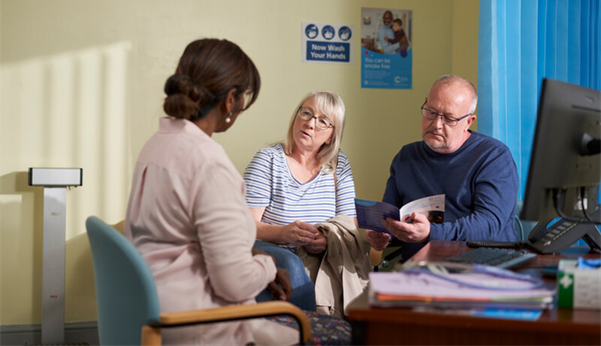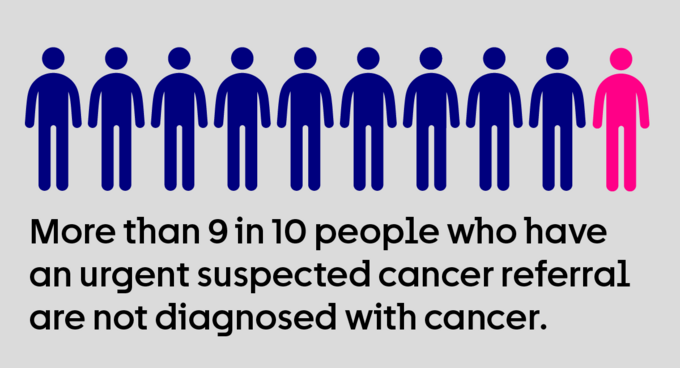Your urgent suspected cancer referral

On this page you can read about:
- What is an urgent suspected cancer referral?
- Does an urgent suspected cancer referral mean I have cancer?
- How long will it take to be seen after my urgent suspected cancer referral?
- Receiving and going to your appointment
- Having tests
- What happens if I have cancer?
- What happens if I don't have cancer?
This information is also available on our publications page. This includes specific leaflets for those living in Scotland, Northern Ireland and Wales.
What is an urgent suspected cancer referral?
Your GP, dentist, nurse or eye doctor (an optometrist) has arranged for you to have tests or to see a hospital doctor, known as a specialist.
Your referral is called an urgent suspected cancer referral. You may have previously heard it be called a ‘two week wait referral’ (2ww). This referral is to investigate your symptoms and find out what is wrong and if it could be cancer.
This information gives a general overview of the urgent suspected cancer referral process. The process may differ depending on the symptoms you are experiencing and what needs to be investigated.
Does an urgent suspected cancer referral mean I have cancer?
It is normal to worry when you are urgently referred. However, more than 9 out of 10 people (more than 90% of people) who have an urgent suspected cancer referral will not be diagnosed with cancer.
This means most people referred this way will not have cancer.
But if it is cancer, cancer diagnosed at an early stage means treatment is more likely to be successful.
How long will it take to be seen after my urgent suspected cancer referral?
You will get your appointment as quickly as possible. The person referring you may be able to give you more information on how long it could take.
If you haven’t received your appointment details in the 7 days after your referral, contact the service that referred you. Explain that you are waiting for an appointment following an urgent suspected cancer referral.
If your symptoms change or get worse, or if you develop new symptoms, talk to your GP.
Receiving and going to your appointment
You may get told your appointment details by post, email or over the phone. If you get a phone call, the number might not display. Please do answer.
You may be booked for multiple appointments, depending on what investigations you need.
It’s very important that you go to all your appointments and tests. If you can’t attend an appointment or test, contact the hospital as soon as possible to rearrange it.
Top tips
- Check your GP surgery has your current address and phone number, including a mobile number if you have one.
- If you need additional support to attend your appointment, let the hospital know as soon as possible. This could include if you need an interpreter with you, or if you need hospital transport, or if you have any other accessibility requirements.
What will happen at my appointment?
Your appointment may be over the phone, or it may be at the hospital. If your appointment is over the phone, a nurse or doctor will call you. If your appointment is at the hospital, you might speak to a nurse or doctor first, or you may be sent straight for tests.
Top tips
- Make sure you know when your appointment is and where you need to go.
- Check if you can take a family member or friend with you for support, or they can listen with you to your telephone appointment.
- Have a paper and pen ready to make notes.
- If you want to record the appointment conversation, make sure you ask for permission first.
What questions can I ask?
Don’t be afraid to ask questions in your appointments and during the process of your investigations. It may help to write down any questions you have beforehand and take it with you to your appointment.
Sometimes it’s difficult to know what to ask. Here are a few ideas that might make it easier:
- Should I make any changes to the medicines I’m taking?
- What tests will I need to have? How long do the tests take?
- What are the benefits and risks of the tests?
- How will I get my test results? When will I get them?
- If I have questions after the appointment, who should I ask?
- What is the next step? When will I next hear from someone?
- If my symptoms get worse, who should I contact?
- Who can I talk to if I need support with how I’m feeling?
We have further advice on what to say to the doctor and top tips for telephone appointments.
Having tests
You should receive information in advance about your tests and anything you need to do to prepare.If you have any questions or concerns about a test, contact the team or service that has requested your tests.
You may need to have more than one test and they may be on different days.
You can find information about the tests you have been requested to have on our tests and scans pages.
Top tips
- Make sure you know where to go for your test.
- The person doing your test won’t be able tell you your results straight away. Ask them how you will get your test results and how long it will take.
How will I find out my test results?
You will get your results by post, over the phone or in-person at an appointment. A doctor might explain your results to you. This is usually your specialist or someone in their team, but it might be your GP.
You may need to have further tests. You can ask your specialist for more information about what the tests are and why you need them.
Top tips
- If you’ve been waiting longer than expected for your results, contact the team or service where you had your test.
- You can also let your GP surgery know you are still waiting.
How long will it take for me to get a diagnosis?
There are waiting time targets to get a diagnosis and start treatment following an urgent suspected cancer referral. These are slightly different across England, Wales, Scotland and Northern Ireland.
Although there are targets, it is not possible to know how long it will take in your individual situation. Along the way you can speak to your GP, nurse or specialist about how long they expect things may take.
Find out more about cancer waiting times.
What happens if I have cancer?
If you are diagnosed with cancer, a specialist doctor will talk to you about the next steps, including treatment options.
We know this is a difficult and worrying time. There is help and support available for you and your family and friends. You will be given lots of information and support by your healthcare team. Your hospital may have a cancer centre. They have people you can talk to and provide written information. You can ask for details of local support groups and counselling services.
If you or someone close to you is affected by cancer and you’ve got questions, you can call our free Nurse helpline on 0808 800 4040, Monday to Friday 9am-5pm.
Visit our About Cancer webpages for information about cancer types and cancer treatment and about coping with cancer
What happens if I don't have cancer?
If you are not diagnosed with cancer, tell your GP if you’re still worried, or if symptoms do not get better. It’s important that you continue to listen to your body. Talk to your GP if you notice anything that isn’t normal for you.
A health scare can make people think about their general health and how to improve it. Not all cancers can be prevented, but there are things you can do to lower your risk of cancer.
Find out about healthy changes you can make to lower your cancer risk.
You can also consider cancer screening when you are invited. Cancer screening looks for early signs of cancer in people with no symptoms. Find out about cancer screening.
National Institute for Health and Care Excellence. NG12: Suspected cancer: recognition and referral. 2023.
Northern Ireland Cancer Network. Northern Ireland referral guidance for suspected cancer. 2024
Scottish Government. Scottish referral guidelines for suspected cancer. 2019.
Last reviewed: 21 August 2024
Next review due: 21 August 2027

